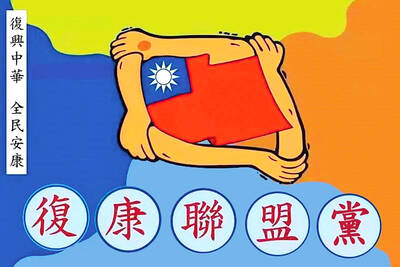The Executive Yuan yesterday approved a proposal that would introduce stricter regulations for teaching language to children under the age of six in cram schools.
If the proposed amendment to the Supplementary Education Act (補習及教育進修法) is passed by the legislature, the Ministry of Education will draw up the required bylaws under Article 16 of the act, said Hsiung Tsung-yeh (熊宗樺), secretary-general of the ministry’s Department of Lifelong Education.
According to the proposed amendment, courses offered by cram schools to children younger than six should be restricted to teaching body movements and the development of artistic talents. These schools would also be required to obtain approval from local governments’ education authorities before they can start classes.
Hsiung said the proposed amendment aims to encourage sound mental development as stipulated in the Protection of Children and Youths Welfare and Rights Act (兒童及少年福利與權益保障法).
Cram schools that teach children English can continue offering these courses as long as it is not taught in a way that would require them to learn how to write or memorize words, Hsiung said.
Schools should offer a lively environment where children can learn English in a natural way without pressure, he added.
Cram schools that offer classes on languages, mathematics, abacus, mental arithmetic or other courses found in violation of the article would be fined up to NT$500,000 and may be repeatedly fined until the problem is addressed.

AIR DEFENSE: The Norwegian missile system has proved highly effective in Ukraine in its war against Russia, and the US has recommended it for Taiwan, an expert said The Norwegian Advanced Surface-to-Air Missile Systems (NASAMS) Taiwan ordered from the US would be installed in strategically important positions in Taipei and New Taipei City to guard the region, the Ministry of National Defense said in statement yesterday. The air defense system would be deployed in Taipei’s Songshan District (松山) and New Taipei City’s Tamsui District (淡水), the ministry said, adding that the systems could be delivered as soon as the end of this year. The US Defense Security Cooperation Agency has previously said that three NASAMS would be sold to Taiwan. The weapons are part of the 17th US arms sale to

SERIOUS ALLEGATIONS: The suspects formed spy networks and paramilitary groups to kill government officials during a possible Chinese invasion, prosecutors said Prosecutors have indicted seven retired military officers, members of the Rehabilitation Alliance Party, for allegedly obtaining funds from China, and forming paramilitary groups and assassination squads in Taiwan to collaborate with Chinese troops in a possible war. The suspects contravened the National Security Act (國家安全法) by taking photos and drawing maps of key radar stations, missile installations and the American Institute in Taiwan’s headquarters in Taipei, prosecutors said. They allegedly prepared to collaborate with China during a possible invasion of Taiwan, prosecutors said. Retired military officer Chu Hung-i (屈宏義), 62, a Republic of China Army Academy graduate, went to China

INSURRECTION: The NSB said it found evidence the CCP was seeking snipers in Taiwan to target members of the military and foreign organizations in the event of an invasion The number of Chinese spies prosecuted in Taiwan has grown threefold over a four-year period, the National Security Bureau (NSB) said in a report released yesterday. In 2021 and 2022, 16 and 10 spies were prosecuted respectively, but that number grew to 64 last year, it said, adding that the Chinese Communist Party (CCP) was working with gangs in Taiwan to develop a network of armed spies. Spies in Taiwan have on behalf of the CCP used a variety of channels and methods to infiltrate all sectors of the country, and recruited Taiwanese to cooperate in developing organizations and obtaining sensitive information

BREAKTHROUGH: The US is making chips on par in yield and quality with Taiwan, despite people saying that it could not happen, the official said Taiwan Semiconductor Manufacturing Co (TSMC, 台積電) has begun producing advanced 4-nanometer (nm) chips for US customers in Arizona, US Secretary of Commerce Gina Raimondo said, a milestone in the semiconductor efforts of the administration of US President Joe Biden. In November last year, the commerce department finalized a US$6.6 billion grant to TSMC’s US unit for semiconductor production in Phoenix, Arizona. “For the first time ever in our country’s history, we are making leading edge 4-nanometer chips on American soil, American workers — on par in yield and quality with Taiwan,” Raimondo said, adding that production had begun in recent